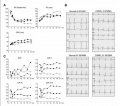File:Electrocardiograph findings in dogs affected with DMD.JPG: Difference between revisions
No edit summary |
|||
| (2 intermediate revisions by the same user not shown) | |||
| Line 12: | Line 12: | ||
This is an Open Access article distributed under the terms of the Creative Commons Attribution License (http://creativecommons.org/licenses/by/2.0), which permits unrestricted use, distribution, and reproduction in any medium, provided the original work is properly cited. | This is an Open Access article distributed under the terms of the Creative Commons Attribution License (http://creativecommons.org/licenses/by/2.0), which permits unrestricted use, distribution, and reproduction in any medium, provided the original work is properly cited. | ||
===Assessment=== | |||
+ Relevant animal disease model. | |||
+ Attempted to explain electrocardiograph in legend. I would have liked to see more explanation about the graphs. | |||
- You have not formatted the reference link nor linked to the original citation correctly, as required by figure criteria and shown correctly below. | |||
<pubmed>17140458</pubmed> | |||
{{Template:2011 Student Image}} | {{Template:2011 Student Image}} | ||
Latest revision as of 16:32, 24 October 2011
Electrocardiograph Findings in Dogs affected with Duchenne Muscular Dystrophy
Electrocardiograph – device used to detect myocardial scarring. The graphs show an increased HR and a shortened PQ interval in DMD affected dogs.[1]
A: Sequential studies in heart rate (HR) (beats/min), PQ interval (ms) and duration (ms) of QRS complex. B: ECGs were recorded from normal dogs, III-301MN and III-1804MN, and CXMDJ dogs, III-302MA and III-1803MA, at 6 months of age. Distinct deep Q waves were present in the CXMDJ dogs. C: Sequential studies in Q/R ratios.
Reference
- ↑ Naoko Yugeta, Nobuyuki Urasawa, Yoko Fujii, Madoka Yoshimura, Katsutoshi Yuasa, Michiko R Wada et al. Cardiac involvement in Beagle-based canine X-linked muscular dystrophy in Japan (CXMDJ): electrocardiographic, echocardiographic, and morphologic studies.BMC Cardiovascular Disorders 2006, 6:47
This is an Open Access article distributed under the terms of the Creative Commons Attribution License (http://creativecommons.org/licenses/by/2.0), which permits unrestricted use, distribution, and reproduction in any medium, provided the original work is properly cited.
Assessment
+ Relevant animal disease model. + Attempted to explain electrocardiograph in legend. I would have liked to see more explanation about the graphs. - You have not formatted the reference link nor linked to the original citation correctly, as required by figure criteria and shown correctly below.
<pubmed>17140458</pubmed>
- Note - This image was originally uploaded as part of a student project and may contain inaccuracies in either description or acknowledgements. Students have been advised in writing concerning the reuse of content and may accidentally have misunderstood the original terms of use. If image reuse on this non-commercial educational site infringes your existing copyright, please contact the site editor for immediate removal.
Cite this page: Hill, M.A. (2024, April 20) Embryology Electrocardiograph findings in dogs affected with DMD.JPG. Retrieved from https://embryology.med.unsw.edu.au/embryology/index.php/File:Electrocardiograph_findings_in_dogs_affected_with_DMD.JPG
- © Dr Mark Hill 2024, UNSW Embryology ISBN: 978 0 7334 2609 4 - UNSW CRICOS Provider Code No. 00098G
File history
Click on a date/time to view the file as it appeared at that time.
| Date/Time | Thumbnail | Dimensions | User | Comment | |
|---|---|---|---|---|---|
| current | 12:54, 7 October 2011 |  | 609 × 538 (64 KB) | Z3332327 (talk | contribs) | Electrocardiograph – device used to detect myocardial scarring. The graphs show an increased HR and a shortened PQ interval in DMD affected dogs.<ref>Naoko Yugeta, Nobuyuki Urasawa, Yoko Fujii, Madoka Yoshimura, Katsutoshi Yuasa, Michiko R Wada et al. C |
You cannot overwrite this file.
File usage
The following 2 pages use this file: